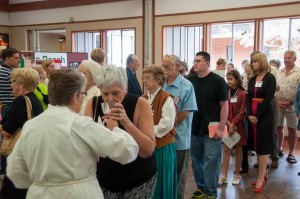 Everyone wants to save the world, but no one wants to help mom with the dishes. –P.J. O’Rourke
Everyone wants to save the world, but no one wants to help mom with the dishes. –P.J. O’Rourke
(Mark 10:35-45)
What is it with Jesus’ disciples? Apparently when he chose them he wasn’t going for the sharpest knives in the drawer. This is the third time in our readings recently, we have watched Jesus’ disciples or a subset of them attempt to establish a hierarchy. Three times they have tried to figure out which one of them is most important, only to have Jesus explain how they just don’t get it. We don’t get his emotional tone, but I imagine it’s gotten old, explaining yet again how the new kingdom he brings is different. Each time he has told them how the servant is really most important, and how those usually considered to be first will be last and visa versa. Usually he throws in something about children and how they are role models of vulnerability and powerlessness. Three times he’s made this point. Are they dense or just not listening?
important, and how those usually considered to be first will be last and visa versa. Usually he throws in something about children and how they are role models of vulnerability and powerlessness. Three times he’s made this point. Are they dense or just not listening?
I am thinking that while they hear what Jesus says, they keep going over the same territory because somehow they just can’t figure how his message connects with their ambitions. Each time Jesus explains this new reality of an overturned hierarchy, he explains how he is going to make it happen. His Kingdom will not come through violence or triumph. Jesus will win by surrendering. His real enemy isn’t Rome, it is death itself, and the only way he will conquer death is to go through it. The disciples must be tired of hearing these strange predictions (Apparently the lectionaries thinks we are tired of it because that part of the story isn’t included.) Maybe the lectionary writers didn’t catch the significance. The disciples certainly don’t. Perhaps they think these predictions are some strange metaphor. Maybe they imagine, as so many Christians do today, that Jesus makes his choices based on scriptural predictions that have nothing to do with them. Maybe they just aren’t thinking at all. However it happens, they just don’t think these predictions or even the example Jesus sets are relevant to their plans to be in charge.
 You don’t have to look too far to find followers of Jesus who think the same way. Politics are the obvious arena, but in business, sports, you name it, you can find many claiming the name of Christ while engaged in tactics Jesus himself would never use. Claiming Jesus’ name doesn’t stop people from doing whatever it takes to win, just like anyone else, even if that means insults, bullying, spreading paranoia, or even lies. Just check out any Internet discussion.
You don’t have to look too far to find followers of Jesus who think the same way. Politics are the obvious arena, but in business, sports, you name it, you can find many claiming the name of Christ while engaged in tactics Jesus himself would never use. Claiming Jesus’ name doesn’t stop people from doing whatever it takes to win, just like anyone else, even if that means insults, bullying, spreading paranoia, or even lies. Just check out any Internet discussion.
This is nothing new. History is filled with Christians not acting like Christ. Kings, conquerors, church leaders–we know so many stories of lives destroyed and societies crushed by people claiming the name of Christian. But let’s not get cynical because history is also full of Christians acting like Christ, offering caring and love, making a positive difference in other people’s lives, even at great sacrifice. 
Are these just two possible ways of being Christian? After all, either path can make a difference, even for the good. Does it really matter if we do what Jesus tells his disciples to do?
Everyone wants to save the world but no one wants to help mom with the dishes.
That’s my quote for the ministry fair. It is more relevant to the Gospel than you might think. It sums up our resistance and offers a way forward.
 You see, as Christians we aren’t interested in living shallow lives. If we were going to do that we wouldn’t need to get up early on Sunday. Jesus’ disciples might have been clueless, but like us they weren’t shallow. They wanted to do things that mattered. That’s why they were following Jesus. That’s why they wanted positions of power and prestige. They weren’t bad people. They just wanted something more. They wouldn’t be the ones wasting time in the kitchen doing the dishes when the world needed saving.
You see, as Christians we aren’t interested in living shallow lives. If we were going to do that we wouldn’t need to get up early on Sunday. Jesus’ disciples might have been clueless, but like us they weren’t shallow. They wanted to do things that mattered. That’s why they were following Jesus. That’s why they wanted positions of power and prestige. They weren’t bad people. They just wanted something more. They wouldn’t be the ones wasting time in the kitchen doing the dishes when the world needed saving.
But if Jesus is right, they are missing the point. If the servant is the most important, then doing those dishes is exactly what Jesus’ top disciples should be doing. That’s the important job. Which makes no sense. Anyone can do the dishes. Saving the world–has anyone figured out how to do that?
OK, trick question. His disciples can’t understand how their ambitions fit into Jesus’ plan because they haven’t seen his victory yet. What the disciples don’t understand is that Jesus isn’t interested simply in regime change. This isn’t a “meet the new boss, ,same as the old boss” sort of revolution. Jesus is changing the whole system. In a world where the powerful squash the poor, where winning is everything, and every person for himself seems like the best strategy, Jesus offers an alternative. The world doesn’t have to be this way. Death doesn’t have to win. We don’t have to be subject to those rules.
his victory yet. What the disciples don’t understand is that Jesus isn’t interested simply in regime change. This isn’t a “meet the new boss, ,same as the old boss” sort of revolution. Jesus is changing the whole system. In a world where the powerful squash the poor, where winning is everything, and every person for himself seems like the best strategy, Jesus offers an alternative. The world doesn’t have to be this way. Death doesn’t have to win. We don’t have to be subject to those rules.
It is possible to build a community where the weak and vulnerable are valued. Jesus is showing how it is done, healing those in need, lifting up children as role models and welcoming the outsiders. We could follow join this new reality and see God’s presence in those same outsiders and vulnerable people. We could know God’s presence and call in own lives if we were to be vulnerable ourselves, dropping the charade of perfection and strength and discovering our strengths in weakness. We could be known and still belong.  We could be part of this new world, this reality of God’s will.
We could be part of this new world, this reality of God’s will.
Jesus is the role model, but washing dishes might also have something to do with it.
The reconciliation and wholeness and belonging that make up this new way don’t happen by accident. You can’t force people to understand each other or even care. That’s where the dishes come in. Working together, doing what needs to be done.–the kingdom comes in these places. That is where those who seem to have nothing to offer find a place to belong; that’s where those who think they are in charge can make space. Differences are put aside. Community is built. Not the community from the one the disciples imagined or that we are used to–here there is a place for all. Here you don’t have to pretend. Here you can take a chance. Here things change. Here we join Jesus in saving the world.
So back to our work here: In our ministries we think that we are saving the world. That is our mission: “to bring Christ to the people, to bring people to Christ.”
Christ to the people, to bring people to Christ.”
But when you look at what we do, a lot of it isn’t all that spectacular. It looks more like doing the dishes. Sometimes it is doing the dishes! There are so many little jobs–cooking breakfast, hosting coffee hour, showing up for worship–just showing up often counts!
This is where we practice doing things differently, as the people of Christ, made in God’s image, empowered by the Spirit with something to offer. If we can’t see Christ in these little jobs, in the people beside us and in front of us, all the theology and Bible passages in the world will make no difference. We will never see Christ in the big world-changing picture. It’s not that we are taking these little jobs too seriously–they really are opportunities for being part of the Kingdom of God. That’s what the servant Jesus speaks of will know. In serving the Kingdom will come.
So the point is–we might want to wash some dishes, that is if we want to be part of something that matters. Together, doing those little things that need to be done, we’ll find ourselves saving the world, one dish at a time!

